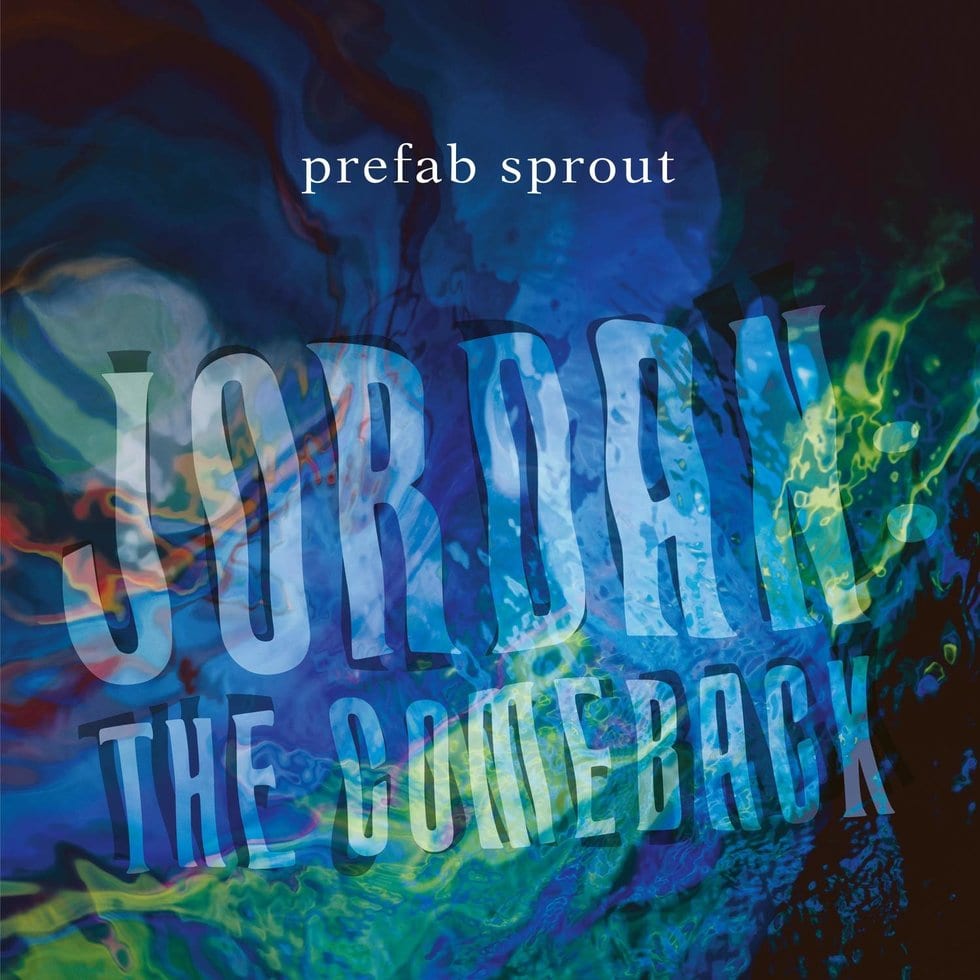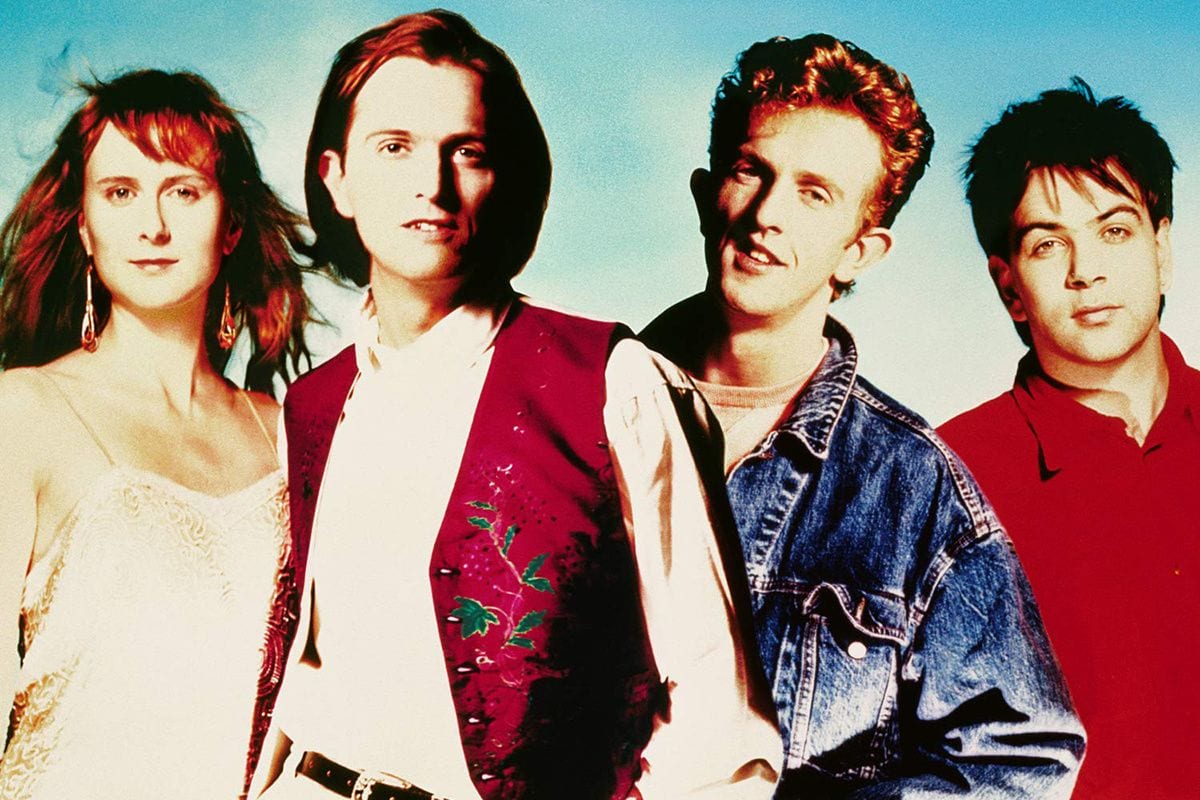



Prefab Sprout’s second album, Steve McQueen / Two Wheels Good (1985), received the whole remastered treatment way back in 2007, for a “legacy edition”. That incited yet another flurry of critical accolades to cement the LP’s classic status and reaffirm such tracks as “When Love Breaks Down”, “Appetite”, and “Goodbye Lucille #1” as exquisitely crafted slices of mid-’80s British indie pop. That version also came with an extra disc of eight unplugged renditions by the band’s singer-songwriter Paddy McAloon, which appeared separately on vinyl for this year’s Record Store Day as Steve McQueen Acoustic. In other words, it’s about bloomin’ time the band’s other peak-period LPs benefitted from some renewed attention.
Sony has at last obliged with vinyl re-releases of the long-overshadowed Swoon (1984), From Langley Park to Memphis (1988), and Jordan: The Comeback (1990), together with a worthwhile compilation, A Life of Surprises (1992), complete with two exclusive tracks. And happily, Paddy has dealt with the remastering himself, in collaboration with his brother and original bandmate Martin, while providing fresh images and artwork to lavish the sleeves of the 180-gram vinyl discs. There are no new acoustic versions this time, nor any demos or previously unreleased songs. But there is still plenty here to cast fresh light on surely the most daring pop music ever to come out of County Durham in North East England. This from a band who aspired not only to the melodic touchstones of Paul McCartney and Brian Wilson, but also the celebrated Broadway compositions of George Gershwin and Stephen Sondheim.
Paddy’s involvement is key to revitalizing these four records, now that he’s attained an almost mythical status as one of the great British songwriters. For a long time fêted by Elvis Costello and a legion of music journalists, he currently lives in his native county, never to be seen performing live as a consequence of contracting Ménière’s disease (causing tinnitus and hearing loss), while increasingly taking the physical form of, well, a wizard. He’s also known for leaving strings of mesmerized listeners in his wake, scrabbling around to find meaning in his cryptic lyrics which deal persistently in the tricky business of legends, romantic ideals, religion, and songwriting. So anything authenticated by Paddy in this new context is certain to be lapped up by his followers. There’s the bonus of some short and typically self-deprecating discussions he’s lately delivered on social media to promote them all.
One Paddy-validated feature of the Swoon re-issue is that the sleeve, so often scrimped on for budget editions, replicates the flashy gatefold version of the original. That allows for a fuller appreciation of this most singular of post-punk debuts. You can mull over the indiscernible cover image, contemplate the dense lyric sheet, and ponder the mock liner notes (written by ‘Emma Welles’), as you descend into music that still has the power to impress and confound. Distinguished by Paddy’s fervent tones, Martin’s exuberant bass playing, and the delicate backing vocals of Wendy Smith, here be wordy verses, hard-to-whistle choruses, knotty arrangements, oblique subject matter, unlikely chord changes, cheap-as-chips production effects, and anything, really, that is antithetical to mainstream rock circa 1984 (think U2, Simple Minds, the Pretenders). The record is indeed a puzzle and one that now holds a similar position in the annals as R.E.M.’s debut, Murmur (1983). It stands utterly alone in the group’s canon, with its enigmatic sound never repeated, and its lyrical meanings still shrouded in mystery.

That the Swoon songs have lost none of their allure as acoustically driven nuggets of experimentalism is testament to Paddy having found free reign in the studio to pursue his unique artistic vision upon signing to the newly founded Kitchenware label in Newcastle, where the only proviso was to record them quickly and inexpensively. “Don’t Sing” twists and turns as an unlikely first single that alludes to the ‘whisky priest’ of Graham Greene’s 1940 novel, The Power and the Glory. The equally angular “Cue Fanfare” then introduces Bobby Fischer, a US chess champion who beat a Russian in the World Chess Championship of 1972. What, you find yourself asking, does he have to do with “sweet, sweet songs that cloud your eyes”? (Answer: he represents to a struggling songwriter a sporting hero who fights his battles for him vicariously.)
It is “Couldn’t Bear to Be Special” and “Elegance” that hit home as the true standouts here. The former is a tortured cry of neuroticism and existential anguish that peaks with an astounding line about words being trains “for moving past what really has no name”. Meanwhile, the latter is beholden to a beautiful melody that packs a profound emotional punch on the subject of, erm, socialism. “I Never Play Basketball Now” deserves a special mention just for pulling off the amazing feat of possessing more chords than any other three-minute song you could care to mention, while still managing to breeze along and hit you with an effortless hook. And it’s fair to say it isn’t really about basketball.
In contrast, From Langley Park to Memphis is absent of sporting metaphors, while visibly enhanced here by a cover photo of the band that omits the ugly strip of text familiar from previous editions. It’s an unadulterated image, as originally intended, that makes the bold statement: here, friends, is a bright and shiny pop group no longer interested in making music solely for studenty types! And certainly, with drummer Neil Conti now firmly on board, the Sprout can be heard on this album to carry on the good work they started on Steve McQueen / Two Wheels Good with synthpop hitmaker Thomas Dolby. It was a much-celebrated band/producer collaboration to rank alongside the likes of Martin Rushent/Human League on Dare (1981), or Martin Hannett/Joy Division on Unknown Pleasures (1979). Furthermore, although Langley Park is not wholly Dolby/Sprout, it’s the underlying reason for it now being routinely stamped as a prime example of ‘sophisti-pop’. The category, of sorts, signifies a fusion of pop and soul on accessible and highly polished, synth-laden tracks that contain silky smooth vocals and denote a fairly hefty studio budget (bigger, certainly, than the one for Swoon).
There’s no doubt that Langley Park succeeds, too, as a source of glossy, refined, and predominantly upbeat songs that were seemingly designed to fight it out with Stock Aitken Waterman on the pop charts. It’s astounding, therefore, that “Cars and Girls”, the album’s well-chosen lead single, failed to make an impression on the UK Top 40 in 1988. It’s now a staple of nostalgia stations such as Absolute 80s Radio, owing to one of the most distinctive vocal intros of all time (“Ba ba baaa, shadodadodoh ba ba baaa”), immaculate drumming, a killer chorus, and some of the cleverest and most affecting lyrics Paddy ever wrote. So go figure. And it’s an added disaster that by addressing the subject of misinterpreting song lyrics, the track itself is subject to constant misinterpretation. No, it’s not a critique of Springsteen (as many assume from opening line: “Brucie dreams life’s a highway”); it’s about an old guy, wearied by cynicism and disappointment, being unable to buy into what he personally views as the Boss’s limited and overly romantic lyrical preoccupations. “Too many roads bypass my way,” he laments, “or they never begin.” It’s heartbreaking, actually.
A similar issue dogs “The King of Rock ‘n’ Roll”, the band’s only top ten single in the UK. It’s now widely viewed as a daft novelty hit because it depicts a washed-up rocker who had success in the ’50s with a daft novelty hit. So it could be that Paddy is just too darn clever for his good at times, even though the track, with its “hot dog, jumping frog” chorus, keeps company with “Big Yellow Taxi”, “Yellow Submarine”, “Creep”, and “Shiny Happy People” (them again) as a catchy signature tune that is atypical of the artist/s who spawned it. More representative, perhaps, is “I Remember That” as it encapsulates Paddy’s Broadway fixation as a big number brimming with brass, a gospel choir, and his own crooner-style vocals. The song stops short of being completely schmaltzy on account of the sobering subject matter. “Name me one little thing / You’ll be wanting to keep / As you give up the ghost / As you sink into sleep.” Here’s a heads up, then, to think about what memories you want to take to your deathbed, on what is, of course, “a journey to dust”.
Somber lyrics aside, Langley Park sparkles from the inclusion of “Nightingales”, a song which is certainly a tad twee, but in an unusually philosophical way that comes with a captivating harmonica break courtesy of Stevie Wonder. It also boasts “Hey Manhattan!”, a successful ’80s update of Bacharach and David’s “Do You Know the Way to San Jose”, as well as the wistful “Nancy (Let Your Hair Down For Me)”, a close cousin of the Beach Boys’ “Caroline No”. However, for all its classic American reference points, the record as a whole remains just a little unsatisfying. It’s hard to say why, exactly, but it relates to the way tracks like “Enchanted” and “Knock on Wood” sound like Scritti Politti, while “The Golden Calf” (with that soft-rock feel) sounds like Del Amitri. Neither would be a bad thing normally, but the whole point of liking Prefab Sprout in the first place was because they sounded like nobody else among their contemporaries.
The songs on Jordan: The Comeback, on the other hand, are resoundingly unique. That’s because no other band, it’s fair to say, has centered a whole album around an invented mythology of Elvis Presley, combined with plentiful, poetic allusion to the Old West and the Bible, and the sonic inventiveness of a fully committed Thomas Dolby. With songs so ambitious in scope, the major selling point of this whole reissue series is that the LP is now officially a double record, as any epic concept album should be. The new format not only enhances the sound quality, but it also renders the staggering range of themes, styles, and moods more distinct. It also highlights Paddy’s remarkable ability as a songwriter — reminiscent of Paul McCartney on the Beatles’ White Album — to plunge into any musical genre he pleases and emerge with a stunning melody.
Side 1 has the feel of a Prefab Sprout singles collection with its array of straight-ahead songs that revel in rock (“Looking For Atlantis”), synthpop (“Wild Horses”), and samba (“Carnival 2000”), together with the regret-soaked ballad “We Let the Stars Go”. Yet it’s side two where things really get interesting, as it constitutes a compelling song cycle charting Elvis’s journey from Tupelo to Vegas to oblivion. The title song sees Paddy perform a monologue as Presley himself, detailing how he’s holed up in the desert (presumed dead) and plotting a blistering return to the limelight. “Layin’ on my back, bidin’ my time / I’m just waitin’ for the right song / Then I’m comin’ back.” The subsequent tracks, “Jesse James Symphony” and “Jesse James Bolero”, liken him to the most famous of American outlaws, before the wonderfully adrenalized “Moondog” has him performing a comeback gig on the lunar surface.
The dramatic drive of Jordan doesn’t slacken on sides three or four, where we find a medley of numbers on the theme of love, and a cycle of often fantastical songs on religion. Paddy is in full-on Broadway mode on many of the tracks, which proves particularly rewarding on “All the World Loves Lovers” with its conversational-verse and simple-chorus structure inspired directly by Stephen Sondheim. And in “One of the Broken”, he is singing as a whisky-voiced deity (“Hi, this is God here”), who tells people they don’t have to worship him with sweet melodies, on a track that has, wouldn’t you know, a sweet melody. It seems certain, too, that on “Michael” he’s singing as Lucifer, asking the eponymous archangel to help him write a letter of forgiveness to God after he’s been cast out of heaven for his sins. The song has a gloriously sinister synth texture worthy of Depeche Mode, but, with lines like “I will sign it ‘Lucifer regrets'”, a pretty incomparable mode of wit.
Representing the height of Prefab Sprout’s musical ambition, then, it’s no wonder that a scattering of Jordan tracks are to be found on A Life of Surprises: The Best of, now also a double record for the first time. It’s hard to argue with the tracklist of this package overall, being 16 of the band’s greatest songs all together on two high-quality vinyl discs. The LP does, however, leave you questioning the absence of the wonderful Protest Songs from the re-issue project when the title track of A Life of Surprises originates from that very LP of 1989. Additionally, it leaves you aghast at just how far into Pet Shop Boys territory the band went with exclusive track “If You Don’t Love Me”, which was, remarkably, a US dance hit in 1992.
There will no doubt be people bemoaning the fact that there are no early versions, live versions, or previously unreleased tracks included in the quartet of re-issues, which could be drawn from Paddy’s supposedly extensive collection of private recordings. There’ll also be those complaining that there are no digital versions of the remastered albums. These people shouldn’t worry, though, as this project simply begins the process of putting Prefab Sprout’s strange and unique LPs (outside of Steve McQueen) back on the musical map. In the next instance, we’ll have the right to expect a demo version of “Jesse James Bolero” with surround sound and alternate lyrics. And a lot more besides.


![Call for Papers: All Things Reconsidered [MUSIC] May-August 2024](https://www.popmatters.com/wp-content/uploads/2024/04/all-things-reconsidered-call-music-may-2024-720x380.jpg)



